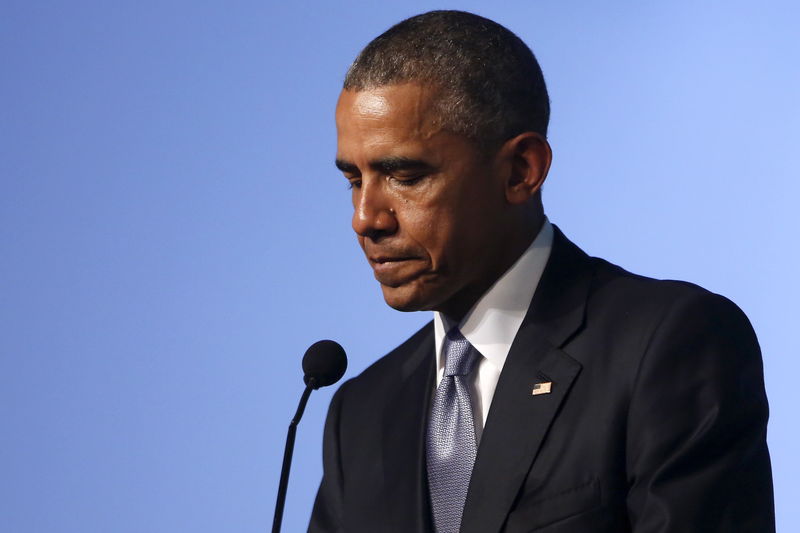By Krista Hughes and Shelby Sebens
WASHINGTON/PORTLAND, Ore. (Reuters) - It is crunch time for President Barack Obama's push to finalize an ambitious Pacific free trade pact and anyone wondering why it is such a tough sell may want to talk to the people of Oregon.
This West Coast state of 4 million people, which hosts major operations of global giants Nike Inc (NYSE:NKE) and Intel Corp (NASDAQ:INTC), exemplifies the nation's ambiguity about free trade and shows the battle lines between its advocates and critics.
With 44 percent of Oregon's exports already heading to the Trans Pacific Partnership countries and an estimated one in five jobs dependent on trade, local businesses are lobbying for the 12-nation pact that would stretch from Japan to Chile, covering 40 percent of the world economy.
Yet scars from two decades of globalization and fears that big business will hijack the agenda make even many of those who may benefit from more trade apprehensive.
"We understand that it's a necessary thing, you have to have trade, you have to be able to put your products in other markets," says John Kleiboeker, 45, Boeing Co worker of 18 years and machinists' union president at the aircraft maker's Gresham factory east of Portland.
"Most people I know, though, feel it should be on a basis where everybody wins instead of just large corporations," he said, adding the main concern is that more jobs will get moved to countries with lower wages and labor standards.
Kleiboeker and many others fear that will be facilitated by proposed "fast-track" legislation that would set ground rules and objectives for the administration to negotiate but only give Congress a yes-or-no vote on the final agreement.
Oregon senator Ron Wyden is working with Republicans to make the bill more palatable to fellow Democrats and the public. His pivotal role has made him a target of anti-trade campaigners, with one group even following him at one point with a 30-foot (9 m) blimp saying: "Ron Wyden: It's up to you. Don't betray us!"
Different polls show different outcomes, perhaps reflecting how questions were framed. A survey for left-wing Democracy for America shows 61 percent of Oregonians think trade deals cost jobs, although Portland Business Alliance polling shows 71 percent think trade is good for the state.
Fast-track legislation could come within days, with the goal of passing it in spring to allow the TPP to clear Congress this year.
The administration argues that without such authorization, U.S. partners will balk at the prospect of whatever they agree being picked apart by Congress. However, the process makes it hard to sell free trade to a skeptical public.
Take Hillsboro, an affluent Portland suburb known as Silicon Forest, where Intel, Oregon's biggest private employer with a 17,500 workforce, and several other tech firms have operations.
Tina Johnston, 51, whose husband works at Intel, owns nearby yarn shop BlackSheep, and counts many Intel workers as customers. She buys yarn both locally and overseas, navigating a maze of tariffs and trade barriers. Still, she is of two minds about the Pacific pact and simply not confident that politicians will get it right.
"I don't really trust the people who are making the decisions," she said.
Mindful of such doubts, Representative Suzanne Bonamici, whose district includes Hillsboro remains on the fence about fast track legislation.
"The diverse district I represent is home to several companies that benefit from trade, but it is also home to many workers who want to know that their jobs are secure," she says.
MIXED EXPERIENCE
Oregon has suffered less from the manufacturing decline than many other states, tech products are its top exports and a wide array of businesses are active exporters.
For example, Corvallis-based Baker Seed Technologies exports grass seeds to China, Vietnam, Indonesia and Japan and its president Stan Baker sees a clear growth opportunity in Asia.
"I believe there's the potential to double our business with the TPP."
Still, memories of jobs lost to foreign competition and factory closures, such as that of International Paper's Gardiner mill in 1998 with 400 jobs, keep voters wary.
The White House says the Pacific pact promises unprecedented workers' rights and environmental safeguards, but the fact details are kept under wraps makes it hard to win over skeptics - something which frustrates Wyden, who has backed eight of 10 major trade bills since 2000.

"If you believe deeply in trade and you want more of it, you should want to get rid of all of this secrecy that makes the public so cynical about trade."